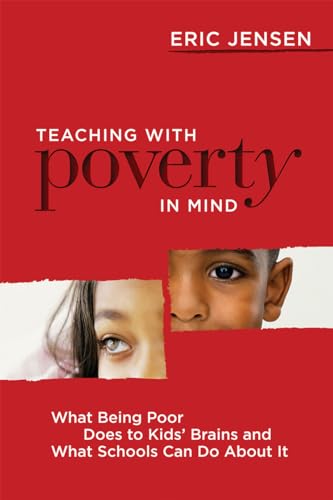Teaching With Poverty in Mind
What Being Poor Does to Kids' Brains and What Schools Can Do About It
Eric Jensen
BOOK REVIEW
Teaching With Poverty in Mind: Unpacking the Silent Struggles of Our Students

In the stark corridors of America's schools, where dreams collide with everyday harshness, Teaching With Poverty in Mind unveils an unsettling truth: poverty isn't just a circumstance; it's a profound barrier that shapes kids' brains and futures. Eric Jensen takes us on a riveting journey through the cognitive landscape of children under the weight of financial hardship, sharing insights that are both alarming and illuminating.
You may not realize it, but the humble classroom you envision as a sanctuary of learning can also morph into a battleground for children grappling with poverty. Jensen's narrative grips you-forcing you to confront the silent screams of those children who arrive with not just backpacks, but a heavy baggage of trauma, anxiety, and emotional scars. Poverty warps their worldviews, impacting everything from memory retention to social interactions, and Jensen's work carefully dissects this disheartening reality.
Through vibrant anecdotes and well-researched data, Jensen sheds light on the startling statistics behind students living in poverty-did you know that nearly 16 million children in the U.S. live in families with incomes below the federal poverty line? Each one of these kids carries a story, a backstory bursting with resilience and heartbreak. The implications for educators are profound, nudging them to reconsider their teaching strategies, and prompting a change in mindset not just for their benefit but for the very lives they touch.
Jensen doesn't just play the blame game; he challenges educators, policymakers, and society at large to step up their game. Schools can-a heady thought, but an achievable possibility. He invites teachers to adopt trauma-informed practices, embrace nurturing environments, and implement strategies that create genuine connections with these children stuck in survival mode. The emotional riptide that poverty creates cannot be ignored; it demands an empathetic response, a collective effort to breach the emotional chasm that so often isolates these young minds.
But, let's dive deeper into the emotional psyche. Children living in poverty develop survival skills that are distinctly different from those of their more affluent peers. These adaptations can manifest as short attention spans, erratic behaviors, or an instinctual mistrust of authority figures. Who wouldn't develop walls in a world that frequently feels hostile? Jensen illustrates these challenges with poignant clarity, making a compelling case that the educational system must adapt to meet these children's unique needs.
Critics may argue that the challenges presented in this book paint too bleak a picture, casting teachers as helpless in the face of such systemic issues. Yet, Jensen's message brims with hope and actionable strategies. He dismantles the narrative of despair to highlight the power within teaching: the ability to ignite change, nurture resilience, and foster an environment where every child can thrive, regardless of their background. Readers are drawn into a world where educators can wield the power to reshape destinies, torching the chains of poverty through innovative teaching approaches and holistic care.
Reflecting on the comments and opinions of readers reveals a powerful dichotomy: many find renewed purpose in Jensen's words, revitalizing their passion for teaching, while others contend that his ideas require substantial systemic changes-an uphill battle amidst bureaucratic inertia. Yet, criticism on this front only magnifies the urgency of the conversation, proving that Jensen's work isn't just a guide; it's a call to arms.
As the narrative unfolds, one thing becomes abundantly clear: children are not merely products of their socio-economic environment. They are individuals with untapped potential, often hidden beneath layers of trauma and despair. Teaching With Poverty in Mind compels you to shift your perspective, to not only understand the children but to stand alongside them-ready to advocate, to strive for change, and to transform educational landscapes that have long been stagnant.
Dive into Jensen's work, and you'll realize this isn't just a book about teaching; it's a profound manifesto for a better future-one where education transcends the limitations imposed by poverty, fostering a society where every child has the chance to unleash their true potential. Don't let this opportunity slip through your fingers. We have a chance to rewrite the narrative, and it starts with embracing the hard truths that come with poverty's burdens. The future of countless children hangs in the balance, and your role in this journey is crucial. 📚✨️
📖 Teaching With Poverty in Mind: What Being Poor Does to Kids' Brains and What Schools Can Do About It
✍ by Eric Jensen
🧾 185 pages
2009
#teaching #with #poverty #mind #what #being #poor #does #kids #brains #what #schools #about #eric #jensen #EricJensen